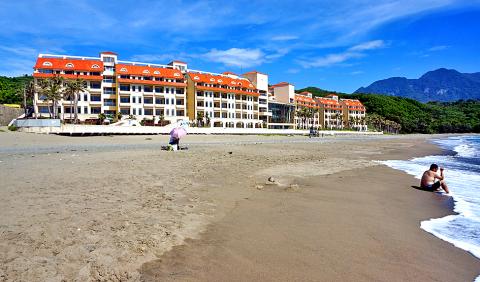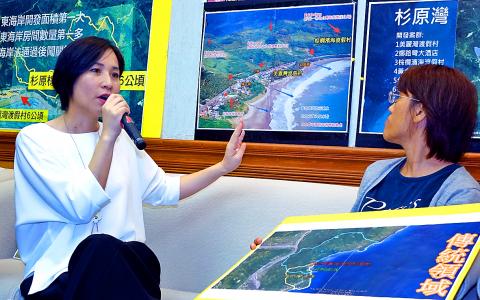Activists and lawmakers yesterday called on the Environmental Protection Administration (EPA) to halt a review of a controversial resort project at Shanyuan Bay (杉原灣) in Taitung County, saying the developer is trying to bulldoze the project without the consent of local Aboriginal communities before the development site is officially recognized as a reserve area.
The Shanyuan Palm Beach Resort (杉原棕櫚濱海渡假村) is the largest development project on the east coast, with a 26-hectare development area — 4.3 times the size of the controversial Miramar Resort Hotel project in Shanyuan Bay, whose environmental approval the court revoked last month.
The EPA suspended the review of the Palm Beach project in July last year, saying the project’s competent authorities — the Tourism Bureau and the Construction and Planning Agency — should clarify the project’s potential conflicts with the Coastal Zone Management Act (海岸管理法), which stipulates the establishment of nationwide coastal reserves by next year.

Photo: Chang Chia-ming, Taipei Times
The EPA’s environmental impact assessment of the Palm Beach project, which is scheduled for today, is once again set to be held amid controversy, with activists calling for the agency to halt the review until coastal reserves and traditional Aboriginal territories are officially zoned.
Lin Shu-ling (林淑玲), a member of an Amis community living in the bay area, said the developer has repeatedly claimed that the development site is not located within traditional Aboriginal territories to circumvent the Indigenous Peoples Basic Act (原住民基本法), which requires developers of a project involving Aboriginal territories to acquire the consent of Aboriginal residents before submitting the project application.
Lin read a statement from the Amis community which said the development would have a dramatic impact on the community and the environment, and the project could not proceed without their consent.

Photo: Chu Pei-hsiung, Taipei Times
Aboriginal communities should also be entitled to lead the planning of coastal reserves, the statement said.
New Power Party Legislator Kawlo Iyun Pacidal rejected the developer’s claim that the bay area is not an Aboriginal territory, saying the Amis have named different locations of the area that do not even have names in Chinese, suggesting Aboriginal people have lived there for hundreds of years.
“The state cannot invade lands belonging to Aborigines in the name of development, and Aborigines’ rights to know must always be protected. The Council of Indigenous Peoples should weigh in on the case and help Aborigines instruct the government in designating traditional territories,” she said.
“The bay is also known as an important turtle nesting beach and coral reef habitat, and development can harm the local ecosystem, especially when the developer illegally started construction before submitting a project plan. How can we trust such a developer to protect the environment?” Citizen of the Earth consultant Tsai Chung-yueh (蔡中岳) said.

US President Donald Trump yesterday announced sweeping "reciprocal tariffs" on US trading partners, including a 32 percent tax on goods from Taiwan that is set to take effect on Wednesday. At a Rose Garden event, Trump declared a 10 percent baseline tax on imports from all countries, with the White House saying it would take effect on Saturday. Countries with larger trade surpluses with the US would face higher duties beginning on Wednesday, including Taiwan (32 percent), China (34 percent), Japan (24 percent), South Korea (25 percent), Vietnam (46 percent) and Thailand (36 percent). Canada and Mexico, the two largest US trading

AIR SUPPORT: The Ministry of National Defense thanked the US for the delivery, adding that it was an indicator of the White House’s commitment to the Taiwan Relations Act Deputy Minister of National Defense Po Horng-huei (柏鴻輝) and Representative to the US Alexander Yui on Friday attended a delivery ceremony for the first of Taiwan’s long-awaited 66 F-16C/D Block 70 jets at a Lockheed Martin Corp factory in Greenville, South Carolina. “We are so proud to be the global home of the F-16 and to support Taiwan’s air defense capabilities,” US Representative William Timmons wrote on X, alongside a photograph of Taiwanese and US officials at the event. The F-16C/D Block 70 jets Taiwan ordered have the same capabilities as aircraft that had been upgraded to F-16Vs. The batch of Lockheed Martin

GRIDLOCK: The National Fire Agency’s Special Search and Rescue team is on standby to travel to the countries to help out with the rescue effort A powerful earthquake rocked Myanmar and neighboring Thailand yesterday, killing at least three people in Bangkok and burying dozens when a high-rise building under construction collapsed. Footage shared on social media from Myanmar’s second-largest city showed widespread destruction, raising fears that many were trapped under the rubble or killed. The magnitude 7.7 earthquake, with an epicenter near Mandalay in Myanmar, struck at midday and was followed by a strong magnitude 6.4 aftershock. The extent of death, injury and destruction — especially in Myanmar, which is embroiled in a civil war and where information is tightly controlled at the best of times —

China's military today said it began joint army, navy and rocket force exercises around Taiwan to "serve as a stern warning and powerful deterrent against Taiwanese independence," calling President William Lai (賴清德) a "parasite." The exercises come after Lai called Beijing a "foreign hostile force" last month. More than 10 Chinese military ships approached close to Taiwan's 24 nautical mile (44.4km) contiguous zone this morning and Taiwan sent its own warships to respond, two senior Taiwanese officials said. Taiwan has not yet detected any live fire by the Chinese military so far, one of the officials said. The drills took place after US Secretary